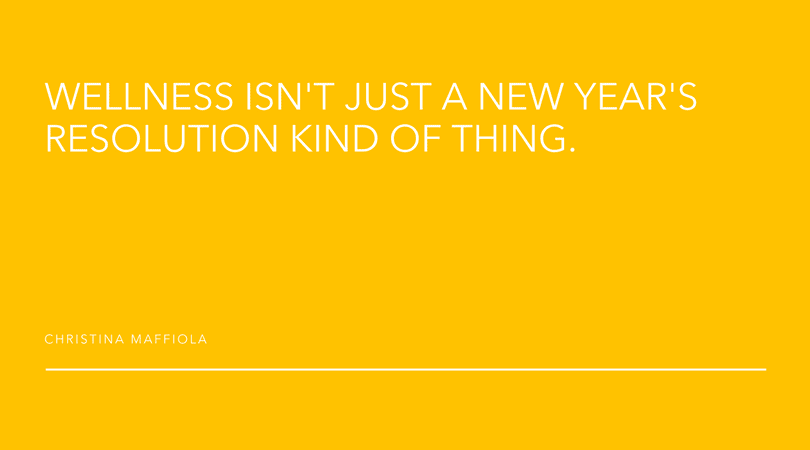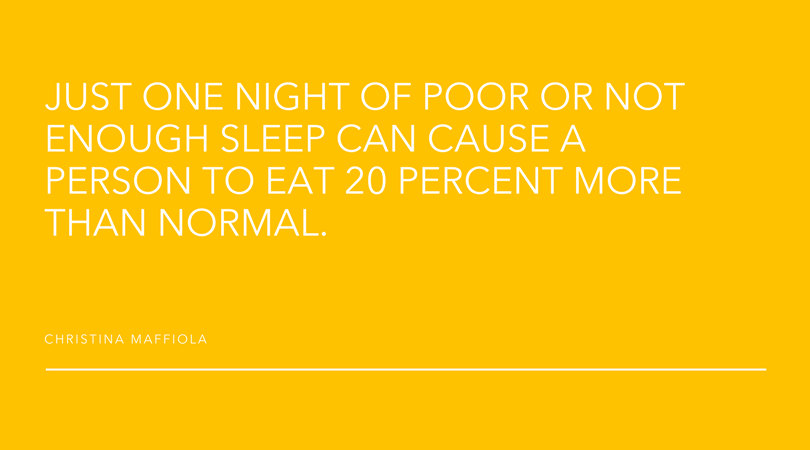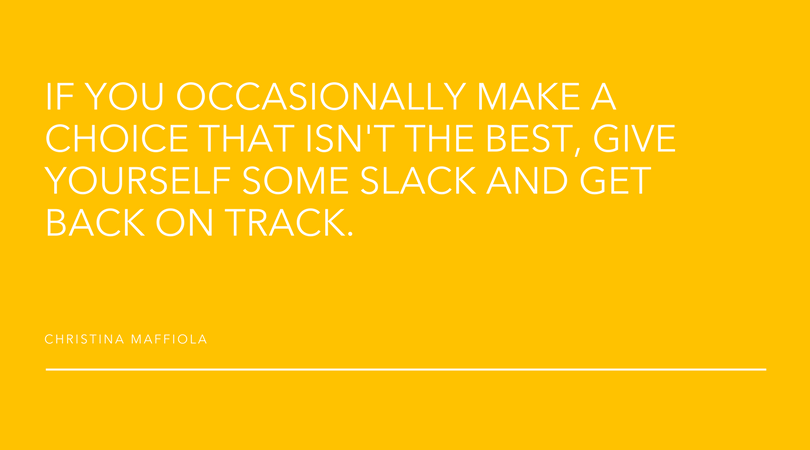By Christina Maffiola RDN, LD
Sticking to Your Wellness Goals
To say good work habits are important in our professional lives can feel like stating the obvious, but many of us talk about it all the time. Why? Perhaps because maintaining these habits yearlong and beyond is hard. Despite the difficulty, we must face the reality: achieving and sustaining a healthy lifestyle is necessary and requires that we figure out how to make wellness a yearlong habit. Wellness isn’t just a New Year’s resolution kind of thing.

Wellness Habits
What kind of habits contribute to wellness as a lifestyle? Eating good, nutrient dense food, exercising regularly and sleeping well are a great start. As we approach the end of National Nutrition Month, I’d like to focus on some practical ways to help you make these habits your own.
As an RDN, I put eating well at the top of the list. While it’s not always possible to avoid “trigger” foods and your favorite treats, establishing regular habits and disciplines will help you maintain a focus on wellness and nutrition year-round.
With that goal in mind, here are some tips on how to make wellness and nutrition a yearlong focus.
How to Make Wellness and Nutrition a Yearlong Focus
1. Plan ahead by looking at restaurant menus in advance of eating out
When dining out, plan ahead. Just like Ben Franklin was quoted saying, “If you fail to plan, you are planning to fail,” the same can be applied to dining out. For lots of people, going out is an excuse to overindulge. It’s easy to sway to the various food temptations, whether it’s that slice of pie behind the counter window or the heaping basket of chips and salsa. If you plan to eat at a restaurant or make a fast food run, look at the menu in advance to survey your options. Many larger restaurants disclose calorie and nutrition information online, which makes it easier to make an informed decision. Also try placing your order first when you eat out with a group; you will be less likely to be influenced by other people’s choices.
2. Make movement a part of your daily routine by treating workouts like a planned appointment
Exercise regularly. Make sure to have a weekly exercise plan that includes rest days. All of us battle times where we face low motivation to work out and get moving so give this a try: treat your planned exercise time like you would a doctor’s appointment. Imagine if missing a workout meant you had to cough up a co-pay! You might still have an excuse to miss your workout, but you’ll be less likely to skip it. The general recommendation for exercise is at least 150 minutes of moderate aerobic activity or 75 minutes of vigorous activity per week. Exercise is shown to boost energy levels, improve your mood, and combat certain health conditions. Make sure to get a variety of different exercises such as stretching, aerobic, and strength training.
3. Stay hydrated by always having a water bottle on hand and using fresh fruit to add flavor
Drink water – lots of it! Water makes up 60-70 percent of a person’s body and enables your body to perform many important functions. Everyone’s water needs are different, but a general recommendation is to drink 64 ounces of water per day. You will need additional water with higher intensity exercise or activities. Challenge yourself to drink a 20oz bottle first thing in the morning, one before lunch and another throughout the day. Be sure to always have a water bottle on hand – get one that you actually like so you’ll be more encouraged to drink. If you need some more flavor, you can add lemon or other fresh fruit to mix things up.
4. Don’t deprive yourself completely of foods you love
People who are successful in making wellness and nutrition a focus in their life don’t completely give up on their favorite foods. Planning one or two treats throughout the week is an easy way to stave off cravings and keep your healthy lifestyle on track.
5. Eat breakfast
Studies have shown that people who eat breakfast on a regular basis:
- are more likely to have a structured eating plan
- experience improved mental performance and better concentration abilities
- are more able to engage in physical strength and endurance activities
- are less likely to snack on empty calories during the day
So why do so many people skip breakfast? Maybe mornings are rushed for you, you aren’t sure what to make or the thought of adding one more thing into your day is overwhelming. If mornings are rushed, try preparing a breakfast dish on the weekend you can pop in the fridge and eat on-the-go throughout the week. Oatmeal, a delicious and nutritious whole grain, is another fast and easy option. Start small and gradually increase to a full breakfast that includes protein, carbohydrate and healthy fats. Need some recipe inspiration? Check out this breakfast bowl from our recipe archives.
6. Curb cravings by snacking healthy
Eat three meals each day and two snacks between meals. Eating snacks between meals will keep your stomach partially full and will decrease the risk of overeating at the next mealtime. A great and well-rounded snack combines a plant source and a protein; for example, an apple with a tablespoon of peanut butter or carrots with hummus. If you know that you are going on vacation soon, make sure that you are packing good quality snacks for the journey.
7. Make a plan to get more sleep
Getting a good night’s rest is essential to maintaining your wellness habits year-round and also plays an important role in weight management. It’s recommended that adults get seven to nine hours of sleep per night. Not sleeping enough can have a negative impact on your immune function and disrupt the hormones that regulate your hunger, fullness and metabolism. Just one night of poor or not enough sleep can cause a person to eat 20 percent more than normal. Set an alarm for when you should start getting ready for bed and consider adding a few foods to your diet that help improve sleep quality.

8. Read nutrition labels to understand what you’re consuming
Be a smart consumer. Eat less saturated fat and sodium. Banish trans fat from your diet. Be wary of foods marketed as “low-fat” that are actually packed with sugar, since sugar is often added to boost flavor when fat is reduced. Also, look at the serving size – the percent daily values refer to the amount of the nutrients per serving, and a food item usually contains multiple servings!
9. Stay on your wellness journey with a friend
Good friends help each other stay healthy. Together you could identify a type of food you’d like to give up, and then encourage one another when the temptation to give in hits. Explore group training classes near when you live – going with a friend makes attending less intimidating and more fun, plus you’ll have the added accountability to go when you’re not feeling it. Teamwork makes the dream work!
10. Use non-food items as a reward
Reward yourself with something other than an indulgent food. Every time you successfully fight off the temptation to buy unhealthy snacks, tally how much money you’re saving in the notes app on your phone. Once that amount accumulates, treat yourself to something like a new shirt, game, or group activity with friends. Small steps add up! If you’re trying to reward yourself at work, consider treating yourself to a walk around the corner or up a flight of stairs instead of snagging chocolate from the communal bowl.
So there you have it. The good news about all these ideas is they really boil down to common sense behaviors that anyone can adopt. Just remember one important thing: no one is perfect. We all will make mistakes when it comes to making wellness a yearlong commitment; the trick is not to allow one lapse (or even a few) to become a total collapse. If you occasionally make a choice that isn’t the best, give yourself some slack and get back on track. Give these 10 tips a try and see how they help you make good on your commitment to wellness. It’s worth it!

About the Author
Christina Maffiola, RDN, LD is a proud part of the Morrison Healthcare team and serves patients at the Atlanta Medical Center in Atlanta, Georgia.
Join the Morrison Healthcare Family
Looking for meaningful work helping people? Do you want to marry your passions and serving others? Check out available team member or management opportunities to join the Compass One Healthcare and Morrison Healthcare family. We believe in the Power of Food to change lives and are proud of the opportunities we have each day to help people and serve alongside world-class clients.
Morrison is a proud part of Compass One Healthcare and Compass Group USA.





